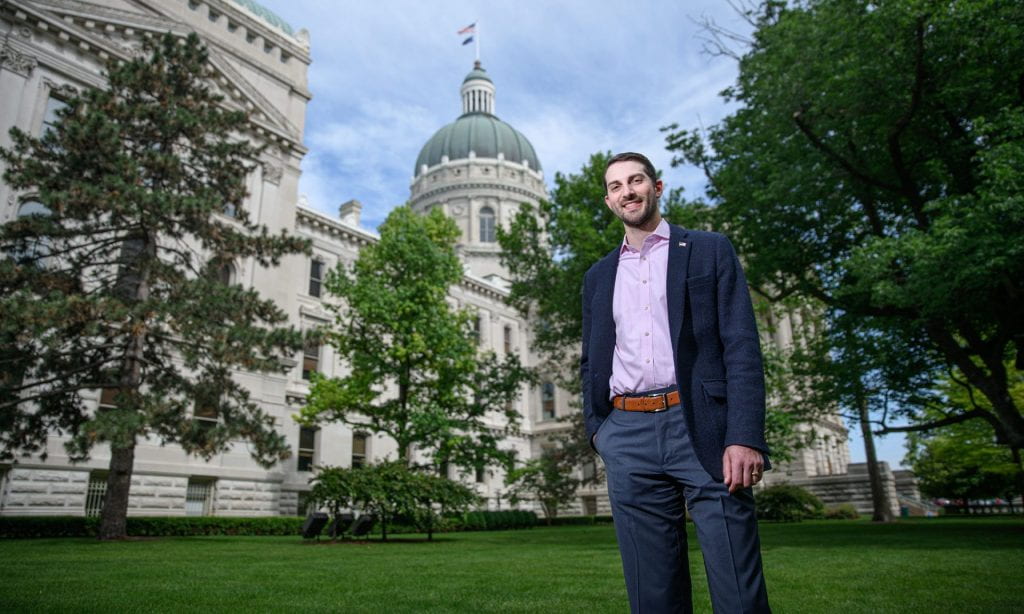Bryan Sacks, MSIS’11, knew pretty quickly that he’d made the right decision to pursue an MS in Information Systems at Indiana University. He landed a fantastic internship the first semester—a stark contrast to the bleak employment scene when he finished his undergraduate degree from another university during an economic downturn.
“I went from not being able to get an interview with consulting firms to accepting a highly coveted internship,” he said. “The MSIS program provides opportunity, something that the student then needs to make the most of.”
Bryan’s performance in his internship lead to a full-time position after graduation, working in the cyber risk practice at Deloitte. Now, seven years after completing his MSIS, he’s chief information security officer for the State of Indiana. Bryan is responsible for establishing the vision and strategy for the state’s cybersecurity efforts. His responsibilities span the state’s Information Sharing and Analysis Center (IN-ISAC), the Security Operations Center (SOC), Security Operations and Engineering, as well as Risk & Compliance teams.
How did he get there so quickly? He points to Kelley’s MSIS program, where he thrived even though his undergrad was not IT-focused. Bryan came to Kelley as an out-of-state student but was confident that the MSIS program “would pay dividends for my career”—and it did so faster than he anticipated.
“It’s a progression,” he said. “The MSIS program prepared me to be a top tier consultant with a Big Four Firm. Without the coursework, case studies, business analysis, etcetera, I wouldn’t have achieved that level of success. One success births another.”
He also credits choosing the right opportunities at the right time during his career, a little luck, and stock in the adage, “IQ gets you hired, EQ gets you promoted.”
“I am a firm believer that emotional intelligence is one of the X factors in becoming a successful executive,” he said.
Bryan shared some tips that have helped his career:
- Practice servant leadership. You can do this at all levels. Everyone at an organization can be a leader. Don’t confuse leadership with being an executive.
- Be likeable. People should want to work with you and be around you.
- Don’t try to be the smartest person in the room; be the best decision maker. Collect as much information as possible within a reasonable period of time and then make the best decision using that information. It’s a skill to develop and work on. Also, break down complex problems into solvable pieces.
- Learn every day. Ask good questions (you know, the ones you couldn’t have just googled).
- Don’t let your age constrain you in thinking you can’t do something. If you do, you won’t achieve it.
- Go find a problem, own it, solve it, do it. Get it done. People latch on when you complete things.
- Know whether you want to be technical, stay technical, or manage people. Managing people is career change.
- Always take the high road. Always. Period.
- Be cognizant of people’s time and understand the value of it. It’s a bit cliché to say NEVER go to someone with a problem without a possible solution, but always consider the other’s person time commitment.
- Check ego at the door. The best idea wins. Who came up with it does not matter.
- Don’t overextend yourself on a team or with projects. It’s important that you deliver, so learn to appropriately manage upward and downward to be able to be consistent.
- Embrace travel opportunities. Bryan said the study tour to India was one of his favorite experiences because of the opportunity to immerse himself in the country’s culture and to better understand the lineage of many of his classmates and future colleagues.
Bryan said the MSIS is a “perfect match for the complex business environment we live in today,” which requires leaders with a good balance and understanding of business and IT. He highly recommends Kelley’s program.
“It’s such an undervalued skill to be able to speak business and IT,” he said. “People try their whole careers and can’t do it. MSIS gives you the opportunity to understand and articulate the relationship from the start. The program should give students the confidence to know they can be successful in many IT roles, and progress at a much quicker pace than the undergraduate.”
Bryan noted that he made dear friends in the program, as well.
“I’ve not only studied with them, we’ve gone through life together,” he said. “We help each other when we have a tough decision or challenge at work. We celebrate big events, such as weddings or children.

Leave a Reply